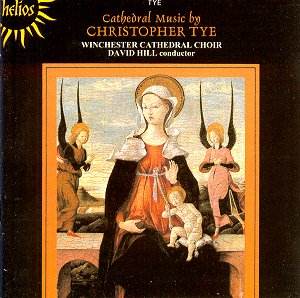Christopher TYE (c.1505-1573)
Cathedral Music:-
Kyrie 'Orbis Factor'; Mass 'Euge Bone'; Motets; Quaesumus omnipotens Deus;
Misere mei, Deus; Omnes gentes, plaudite manibus; Peccavimus cum patribus
nostris
 The Choir of Winchester
Cathedral/David Hill
The Choir of Winchester
Cathedral/David Hill
Rec Winchester Cathedral March 1990
 HYPERION CDH55079
[64.38]
HYPERION CDH55079
[64.38]
Crotchet
AmazonUK AmazonUS

This CD comes in Hyperion's Helios collection. These are emerging at about
3 a month, and it is quite an interesting game of guesswork to decide which
of Hyperion's back catalogue will be re-released. I hadn't expected Christopher
Tye I must say, but then I should have done.
'CD Review' said of the disc: "A perfect introduction to Tye's sacred music"
and the Gramophone "What a marvellous composer, and what a performance",
yes indeed. The Winchester is a very top choir especially in this repertoire.
A recent release of theirs has been of Tallis's Missa Salve intemerata
(Hyperion 67207), which is equally fine.
There is spirited singing here and with superb intonation and fantastic life.
Tye's music benefits from this 'up front' approach. Much of the mass is joyous
and in a bright major tonality; the power of the boys is especially telling
in the Gloria and the Sanctus. There is a major key feel, not
surprisingly, to the joyous motet 'Omnes gentes' (Psalm 47).
As a choirboy myself I seem to recall singing simple Tye anthems in English
such as 'O Come ye servants of the Lord' and 'Christ rising
again' in cheap editions anthologised by the R.S.C.M. but the composer
did not find this style totally conducive. In 1560, in his mid-50s, and now
in the reign of Queen Elizabeth I, he was ordained and seems to have stopped
writing large-scale church music. He turned instead to instrumental works
and especially to the 'In Nomine' for viol consort, written possibly
from the late 1520s to 1550s. The 1520s may be the date of the mass but
stylistically it seems more likely to be a date in the mid-1540s, during
the reign of Edward VI, when Tye could have submitted his mass as part of
his degree of Mus.D. at Cambridge. Tye was rather a favourite of the King
whose early death seems to have affected the furtherance of his career. This
information comes from the excellent CD notes by Andrew Parker who says a
great deal about the composer but rather less about the music, which is a
little frustrating.
Tye has left us three masses. One, 'The Western Wind Mass' was recorded
in 1982 by New College Oxford on CRD 1105 and is worth tracking down. It
is most certainly strongly influenced by Taverner, with its soloistic sections
and melismatic lines. The 'Euge Bone' in 6 parts, although a festive
mass, is not in the massive choral style of his older contemporaries like
Taverner and Ashwell, or the Eton Choirbook masters. It is shorter and plainer.
The Kyrie 'Orbis Factor' is a separate piece but surprisingly has
one or two very ornate passages reminding me of Taverner or Browne. It is
a highly original composition for its date. There are several simple homophonic
sections i.e., the beginning of the Sanctus, and the Agnus dei
(which for some reason has an extra petition) with its beautifully floating
melody, just the sort of thing to please the Protestant king. It is also
more typical of later Tudor music by Mundy or even Byrd. Remembering that
Tye is contemporary of John Shepherd, then Tye's music appears rather modern
in comparison with Shepherd's equivalent Latin antiphons .
The motet 'Peccavimus cum patribus' in 9 parts, is the longest single
work on the disc, and at over 13 minutes is Tye's masterpiece. It may be
related to the recorded mass and is probably an early work (c.1528).
It is a tour-de-force for the men who sing without a break. The boys however
have breaks within the structure and their contribution increases as the
work reaches its climax. "Pour into our hearts thy most holy love ….
and a burning desire for the heavenly kingdom, and let thine almighty goodness
make them grow more and more." New College Oxford on the same CRD disc mentioned
above also recorded this motet, and their faster pace gives a better overall
view of its structure.
To sum up. This is a fine disc, the music is attractive and the polyphony
never too impenetrable or over long. The singing is first class. Although
the boys sound little tired, at the end of a recording session possibly,
in the 'Peccavimus', this is by no means a drawback. Anyone who likes
English polyphony should get this CD which is most attractively priced.
Gary Higginson

